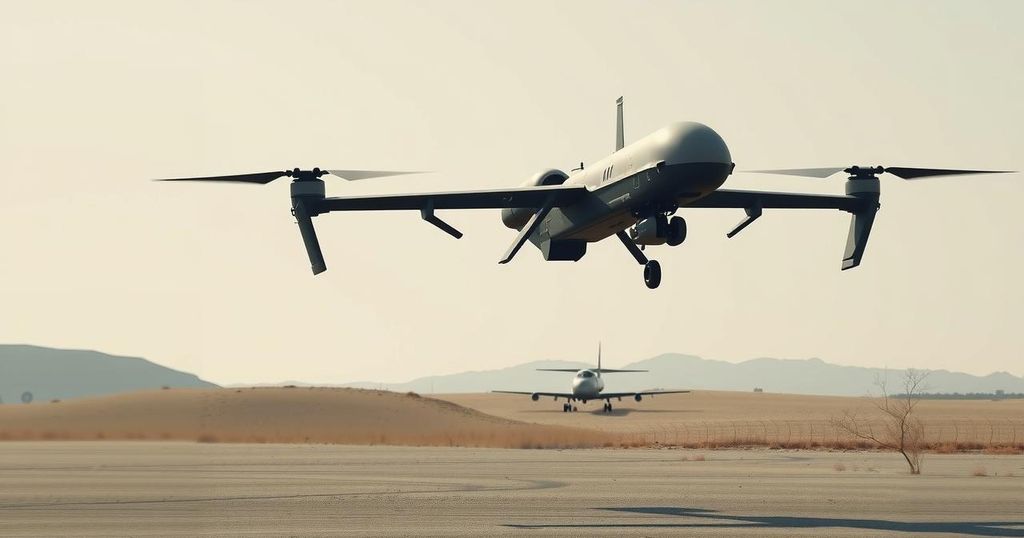Kurdish Military Official Denies Drone Acquisition from Iran, Critiques Turkish Media Propaganda
A Kurdish military official has denied claims that Kurdish forces acquired drones from Iran, attributing such allegations to Turkish propaganda. He emphasized that their drone capabilities are basic and developed internally. The official criticized Turkish media for distorting Kurdish forces’ image and highlighted ongoing Turkish military threats. The region controlled by Kurdish forces is deemed the safest in Syria, yet concerns persist about Turkish expansion and extremist risks following the Syrian conflict’s ongoing instability.
A Kurdish military official emphasized during a video call with The Jerusalem Post that the Kurds did not obtain drones from Iran, labeling such claims as Turkish propaganda. These statements followed an article from Turkish publication Yeni Safak, which alleged that Kurdish forces had acquired drone technology from Iran. The official stated, “We did not acquire any drone capabilities from the Iranians. Our drone capabilities are very basic and they are all made in-house, in initiatives led by our fighters.” The official criticized Yeni Safak for being aligned with Turkish President Erdogan’s political agenda, accusing it of attempting to tarnish the image of Kurdish forces by falsely linking them to radical regimes.
The Kurdish official further commented on the territorial situation, claiming that Kurdish forces control 30-35% of Northern Syria, which he argued is the safest area in the country currently. He noted that Kurdish autonomy challenges Erdogan’s ambitions, which seek to re-establish dominance reminiscent of the Ottoman Empire. He added, “We are being attacked even now, as we speak, despite being Syrians ourselves.” The ongoing conflict and media manipulation further intensify the Kurdish plight against Turkish expansionism.
In response to the Yeni Safak publication, the Syrian Democratic Forces (SDF) condemned these accusations on social media, asserting the authenticity of their own drone capabilities as self-developed. They labeled Turkish media narratives as falsehoods aimed at undermining Kurdish forces and inciting hostility. The relationship between Turkey and the Kurds is fraught with tension due to historical grievances stemming from ethnic conflicts and the quest for Kurdish independence.
The article indicates that Turkish military operations targeting Kurdish-populated regions in Syria have escalated amidst concerns of extremist influences exploiting the vulnerability of minority groups. The Kurdish official described Turkey and Iran as both governed by extremist regimes, with concerns that Turkish influence could grow following a potential decline of Iranian sway in the region. He expressed apprehensions about the future under the current Syrian government’s ties to Turkey, highlighting the unfortunate displacement of Kurds from their historical lands.
The official expressed skepticism about prospects for Kurdish rights under the new regime, while acknowledging international efforts for a democratic future in Syria. He outlined an increasingly precarious situation characterized by rising violence against minorities and a surge in Islamist extremism. Despite these challenges, he honored the historical role of the Jewish people in the region, viewing Israel as a potential ally capable of contributing to the stabilization and peace efforts necessary to address regional terrorism.
This article pertains to the escalating tensions between Kurdish forces and Turkey, stemming from long-standing ethnic discord over Kurdish autonomy and perceived Turkish expansionism in the region. The Kurdish minority, constituting a significant population in Turkey, has faced military action deemed as unjust by their leaders. The recent allegations about drone capabilities are interlinked with ongoing media narratives propagated by Turkish outlets suggesting Kurdish cooperation with Iran. Given the geopolitical dynamics, particularly in Syria, the position of the Kurds remains precarious amid interests from both Turkish and Iranian state actors.
In summary, the Kurdish military official strongly refuted claims of Iranian drone acquisition, maintaining that their capabilities are homegrown and basic. The ongoing conflict between Turkey and the Kurds is compounded by historical grievances and current geopolitical maneuvers. Kurdish autonomy in Syria is increasingly challenged by external pressures, especially from Turkey, while the prospects for collaborative and peaceful coexistence with neighboring powers remain uncertain, particularly with the rise of extremist factions.
Original Source: www.jpost.com




Post Comment